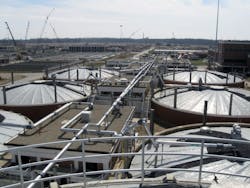Columbus, Ohio, Begins Pioneering Wastewater Treatment Upgrades
The city of Columbus, Ohio, has engaged a team led by Brown and Caldwell to deliver professional design services for a new and improved acid phase digestion system at its Southerly Wastewater Treatment Plant (SWWTP).
The SWWTP is one of the largest facilities of its kind in the country, situated on 288 acres and serving over 530,000 residents. With an average flow of 120 million gallons per day, its two-phase digestion process consists of two sludge storage silos, six methane phase digesters, and three acid phase digesters (APDs) to produce a Class B biosolids product for land application and other beneficial uses.
The project, SWWTP Digester Process Expansion - Phase II, will rehabilitate the APDs and other aging ancillary equipment to create a robust and resilient acid phase digestion system with a multitude of capacity-enhancing, financial benefits.
“This important project will allow us to continue to improve reliability, increase efficiency, meet regulatory guidelines, and enhance service for a growing customer base. We’re evaluating several innovative processes to solidify the City’s beneficial reuse and environmental goals,” said Columbus SWWTP Plant Manager Darin Wise.
The project is considered a once-in-a-generation opportunity to plan and evaluate innovative digester processes, including Acid+ digestion, a cutting-edge project with the Water Research Foundation. Acid+ has the potential to revolutionize wastewater treatment by reducing operations and maintenance expenses, yielding higher quality biosolids (Class A) and biogas products, and achieving cost-effective nutrient recovery with simple retrofits to existing equipment.
A phosphorous recovery study will evaluate options to produce high-quality, low phosphorus biosolids for agricultural use while addressing future nutrient load increases in line with national permit limits. Considerations will be included to identify, restrict, or possibly destroy emerging contaminants loading in downstream biosolids before reuse.
Furthermore, an investigation into the creation of a fats, oils, and greases receiving station and feasibility analysis of co-digestion - sludge with organics/food waste – to supercharge biogas production and create an alternative revenue stream, is part of the project. This includes an assessment on availability and providers of organic waste in the central Ohio region and any digestion system improvements required to incorporate co-digestion for beneficial reuse.
The Brown and Caldwell team will provide preliminary design, detailed design, and engineering services during construction. A critical design component includes the continual, safe, and efficient operation of the plant during construction in compliance with National Pollutant Discharge Elimination System requirements.
As well as undertaking various condition assessments and feasibility studies, the team will prepare construction cost estimates, develop bid documentation, and help evaluate qualified firms.
“We’re excited to partner with Columbus to achieve their vision of sustainable planning for future growth, resource recovery, and continual regulatory compliance,” said Brown and Caldwell Project Manager Dante Fiorino. “Our team is ready to help the City identify innovative solutions to meet current and future wastewater needs while simultaneously lessening the burden on ratepayers by eliminating or deferring expensive capital investments.”
With Acid+ digestion research and preliminary design recently underway, detailed design is scheduled for completion by the end of 2022, paving the way for construction-phase activities.
